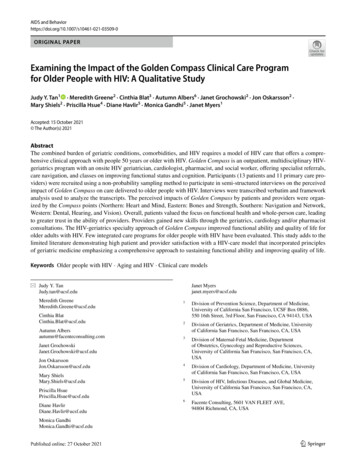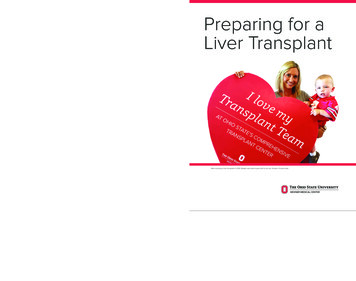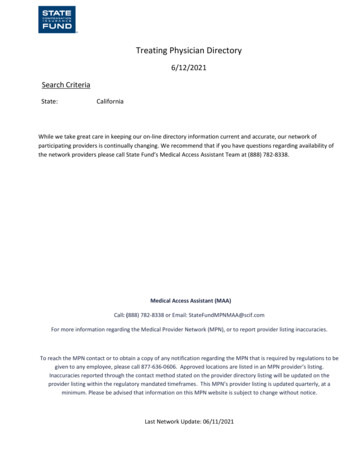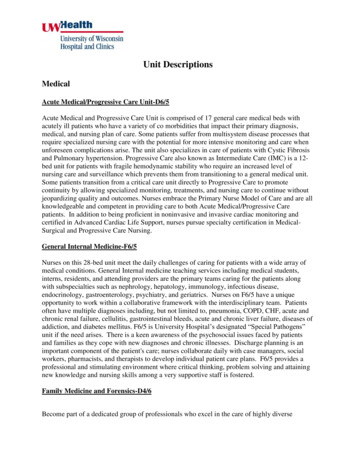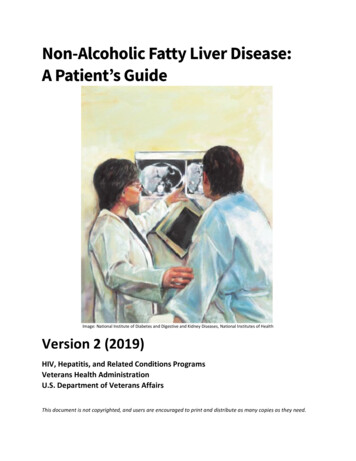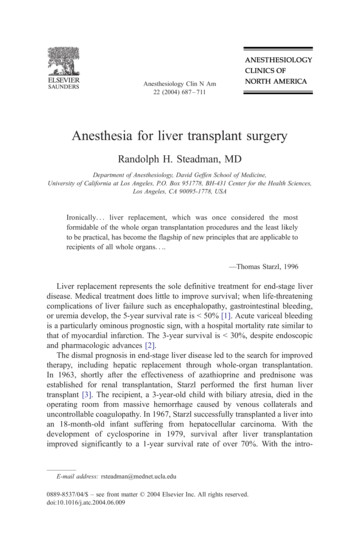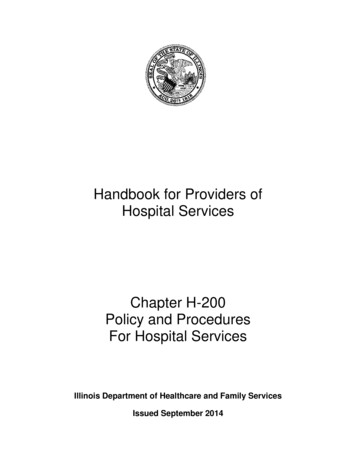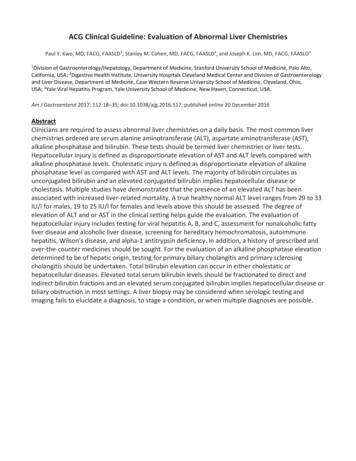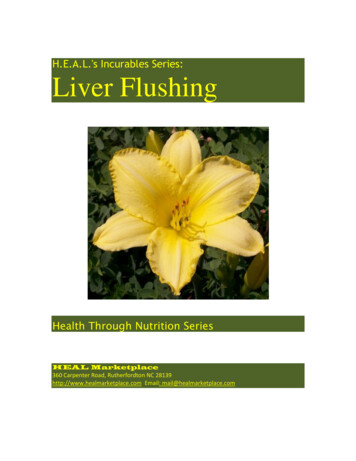
Transcription
Liver TransplantPatient Handbook
Liver Transplant Phone Number1 (800) LIVER TX(548-3789)Pediatric Phone Number1 (415) 476-5892Leave your name, date of birth,phone number, and a brief message.Your message will be returned withinone business day.
Table of ContentsFrequently Asked Questions . . . . . . . . . . . . . . . . 1IntroductionLiver Transplant Service Phone Numbers. . . . . . 2Diuretics. . . . . . . . . . . . . . . . . . . . . . . . . . . 17Anti-ulcer Medications . . . . . . . . . . . . . . . . 18High Blood Pressure Medications(Anti-hypertensive) . . . . . . . . . . . . . . . . . . . 18Consulting Other Specialistsat UCSF Medical Center. . . . . . . . . . . . . . . . . . . 3Ultrasound . . . . . . . . . . . . . . . . . . . . . . . . . . . . 19UCSF Adult Clinic Phone Numbers. . . . . . . . . . . 4CT Scan. . . . . . . . . . . . . . . . . . . . . . . . . . . . . . 19UCSF Pediatric Clinic Phone Numbers . . . . . . . . 5ERCP/PTC . . . . . . . . . . . . . . . . . . . . . . . . . . . . 19Now That You Have Your Liver Transplant. . . . . . 6Liver Biopsy. . . . . . . . . . . . . . . . . . . . . . . . . . . 19Your Local Health Care Provider, the TransplantTeam and Your Insurance . . . . . . . . . . . . . . . . . . 6Medications and Diagnostic TestsWhen You Go HomeOutpatient Care Guidelines. . . . . . . . . . . . . . . . 20General Information. . . . . . . . . . . . . . . . . . . . . . . 7Liver Transplant Clinic. . . . . . . . . . . . . . . . . . . . 20Self-Medication Schedule. . . . . . . . . . . . . . . . . . 7Adult Clinic. . . . . . . . . . . . . . . . . . . . . . . . . 20Your Medicine Schedule . . . . . . . . . . . . . . . . . . . 7Pediatric Clinic . . . . . . . . . . . . . . . . . . . . . . 21Medicine Times. . . . . . . . . . . . . . . . . . . . . . . . . . 8Outpatient Liver Biopsy. . . . . . . . . . . . . . . . . . . 21Warnings About Medications. . . . . . . . . . . . . . . . 8Daily Routine. . . . . . . . . . . . . . . . . . . . . . . . . . . 23Immunosuppressive Medications. . . . . . . . . . . . . 9Routine Follow-up Care. . . . . . . . . . . . . . . . . . . 23Tacrolimus (Prograf ). . . . . . . . . . . . . . . . . . . 9Your Local Health Care Provider's Role. . . . . . . 24Cyclosporine (Neoral , Gengraf ) . . . . . . . . 11Laboratory Tests and Lab Letters . . . . . . . . . . . 24Mycophenolate Mofetil(CellCept , Myfortic ) . . . . . . . . . . . . . . . . . 12Laboratory Records andVital Signs Flow Sheets. . . . . . . . . . . . . . . . . . . 25Everolimus (Zortess ) . . . . . . . . . . . . . . . . . 13Medication Levels. . . . . . . . . . . . . . . . . . . . . . . 32Sirolimus (Rapamune ). . . . . . . . . . . . . . . . 14Prednisone. . . . . . . . . . . . . . . . . . . . . . . . . 15Other Medications You May TakeAfter Your Transplant. . . . . . . . . . . . . . . . . . . . . 16Antifungal Medications. . . . . . . . . . . . . . . . 16Antivirals. . . . . . . . . . . . . . . . . . . . . . . . . . . 16Antibiotics. . . . . . . . . . . . . . . . . . . . . . . . . . 17Immunization and Immune ProtectionTuberculosis (TB) testing using purified proteinderivative (PPD). . . . . . . . . . . . . . . . . . . . . . . . . 33Immunizations. . . . . . . . . . . . . . . . . . . . . . . . . . 33Pneumonia. . . . . . . . . . . . . . . . . . . . . . . . . . . . 33Flu vaccine . . . . . . . . . . . . . . . . . . . . . . . . . . . . 33
Diphtheria/tetanus toxoid/pertussis (DPT). . . . . 33Acne. . . . . . . . . . . . . . . . . . . . . . . . . . . . . . . . . 47Tetanus. . . . . . . . . . . . . . . . . . . . . . . . . . . . . . . 33Dry Skin . . . . . . . . . . . . . . . . . . . . . . . . . . . . . . 48Human Papillomavirus (HPV). . . . . . . . . . . . . . . 34Cuts and Scratches. . . . . . . . . . . . . . . . . . . . . . 48Hemophilus B (HIB). . . . . . . . . . . . . . . . . . . . . . 34Increased Hair Growth. . . . . . . . . . . . . . . . . . . . 48Hepatitis A (Hep A) . . . . . . . . . . . . . . . . . . . . . . 34Hair Care. . . . . . . . . . . . . . . . . . . . . . . . . . . . . . 48Hepatitis B (Hep B). . . . . . . . . . . . . . . . . . . . . . 34Dental Care. . . . . . . . . . . . . . . . . . . . . . . . . . . . 49Inactive Polio Virus Vaccine (IPV). . . . . . . . . . . . 34Clearance for Dental Care. . . . . . . . . . . . . . . . . 50Varicella Zoster (Shingles) . . . . . . . . . . . . . . . . . 34Smoking. . . . . . . . . . . . . . . . . . . . . . . . . . . . . . 51Varicella (Chicken Pox) . . . . . . . . . . . . . . . . . . . 34Alcohol / Illegal Drugs . . . . . . . . . . . . . . . . . . . . 51Measles, Mumps, Rubella (MMR) . . . . . . . . . . . 34Sexuality. . . . . . . . . . . . . . . . . . . . . . . . . . . . . . 51Oral Polio Virus Vaccine (OPV). . . . . . . . . . . . . . 34Family Planning. . . . . . . . . . . . . . . . . . . . . . . . . 51Immunizations for Pediatric Patients . . . . . . . . . 35Return to Work / School/ Disability . . . . . . . . . . 52Travel . . . . . . . . . . . . . . . . . . . . . . . . . . . . . . . . 53Nutrition Following Liver TransplantationShort Term Nutrition Management. . . . . . . . . . . 36Sodium (salt). . . . . . . . . . . . . . . . . . . . . . . . 38Potassium. . . . . . . . . . . . . . . . . . . . . . . . . . 39Other Health Care Concerns. . . . . . . . . . . . . . . 54Illness and Infection. . . . . . . . . . . . . . . . . . . . . . 54Colds and Flu . . . . . . . . . . . . . . . . . . . . . . . . . . 54Herpes Zoster (Shingles) . . . . . . . . . . . . . . . . . 55Nutrition for Pediatric PatientsFollowing Liver Transplant. . . . . . . . . . . . . . . . . 40Persistent Headaches. . . . . . . . . . . . . . . . . . . . 55Long Term Nutritional Management. . . . . . . . . . 40Skin Eruptions . . . . . . . . . . . . . . . . . . . . . . . . .55Low-Fat Cooking Tips. . . . . . . . . . . . . . . . . . . . 41Thrush. . . . . . . . . . . . . . . . . . . . . . . . . . . . . . . . 55Food Safety After Transplant. . . . . . . . . . . . . . . 42Chicken Pox, Measles, and Mumps . . . . . . . . . 55Emergency Medical Identification . . . . . . . . . . . 55Fitness For LifeGuidelines for Visiting Transplant Children. . . . . 56How to Start an Exercise Program. . . . . . . . . . . 43U .S . Transplant Games. . . . . . . . . . . . . . . . . . 45ResourcesGetting Back into Life!. . . . . . . . . . . . . . . . . . . . 58Health MaintenanceAdult Support Group. . . . . . . . . . . . . . . . . . . . . 59Skin Cancer . . . . . . . . . . . . . . . . . . . . . . . . . . . 47Caregiver Support Group . . . . . . . . . . . . . . . . . 59Routine Self Exam. . . . . . . . . . . . . . . . . . . . . . . 47Pamphlets / Organizations / Websites. . . . . . . . 60
Frequently Asked QuestionsMedication questions: What do I do if I forget to take my anti-rejection(immunosuppressive) medication? See page 9under "missed dose" listed under each medication description. What do I do if I need a prescription refill? Callyour pharmacy who will contact the Transplant Office for refill authorization. What do I do if my pharmacy hasn’t receivedprior authorization for a medication? Call800-548-3789 and leave a non-urgentmessage. What over the counter medications can I take?See page 55. What should I do if am prescribed a medicationby another provider? See page 55. Can I take Tylenol/ acetaminophen, and nonsteroidal anti-inflammatory drugs (NSAIDs)? NSAIDs:ibuprofen, Aleve, Advil, Motrin, Naprosyn, etc.See page 8.Vaccination information: Which vaccines can I receive and which should Iavoid? See page 33. What if I am traveling out of the country? Seepage 53.Labs: What do I do when my standing order expires?Call (800) 548-3789 and leave a non-urgentmessage. Kaiser insured patients call888-551-2740 and leave a message for yourKaiser coordinator. How often will I need to have labs drawn?Frequently right after transplant, then onceper month for a lifetime. How can I get my lab results? Ask your lab howyou may also receive lab results. Some labs/providers have ways you can access your labson-line. Do my labs need to be drawn while fasting? No,but you must draw labs first thing in the morning before taking your anti-rejection medications.Low Potassium diet: What foods should I limit or avoid to keep mypotassium level in range? See page 39.Illness and infection: What over the counter medications can I take?See page 54 and page 8. When and who should I call when I am not feelingwell? See page 54.Dentist: Do I need antibiotics before going to the dentist?See page 49.Medical records How do I receive a copy of my medical records?Call medical records 415-353-2885. The transplant office is not authorized to send medicalrecords.Disability and FMLA forms and work release forms: (See page 52) How do I get my forms filled out and signed formedical leave? Call 800-548-3789 and leave amessage for your transplant provider. When can I return to work? See page 52.
IntroductionLiver Transplant Service Phone NumbersThe Liver Transplant Office is open from 8am to 5pm, Monday through Friday. The Liver Transplant answeringservice will accept emergency phone calls before and after office hours, on weekends, and all holidays.Urgent Calls OnlyThe 24 hour urgent transplant number is 415-353-1888. Pediatric patients should call 415-476-5892. This number is answered 24 hours a day, 7 days a week. If you experience an urgent health concern during non-businesshours, please use the urgent transplant phone number. If you feel your concern can wait until the next businessday, please call during business hours and ask that your transplant provider (NP/PA) be paged.Leave the following information when you call the 24 hour urgent transplant number: Your name (spell it for the service) and date of birth Your phone number(s), including area code Brief reason for callNational Emergency Number Is 911 Call 911 or have a family member or friend take you to the nearest emergency room if you have any of thefollowing: Chest pain Bleeding Trouble breathing UnconsciousnessNon-Emergency Calls Reporting lab values is not an emergency. Prescription refills are not an emergency. Call 1-800-LIVER TX (548-3789) with questions, or messages for the transplant team. Messages may be left24 hours a day. Your message will be returned within one business day. Requests for routine prescription refills should be called in by your pharmacy to the above number. Pediatric patients should call 415-476-5892 or 415-476-8636.INTRODUCTION2
Consulting Other SpecialistsYou may be sent to specialists in other departments at the UCSF Medical Center and clinic, so you need to keepa record of the provider’s name in each department in order to make an appointment. Keep a list of these providers and their departments for future reference.Your primary care provider may refer you to specialists within your insurance plan. Include these providers onyour list for future reference as well.Providers in Other Departments Cardiologist (Heart) Dentist (Teeth) Dermatologist (Skin) Endocrinologist (Diabetes) ENT (Ear/Nose/Throat) Ophthalmologist (Eye) Gynecologist (Women’s health) Orthopedist (Bone) Primary Care/Internal medicine Other3LIVER TRANSPLANT HANDBOOK
All UCSF Adult Clinic Phone Numbersare in the (415) Area CodeDental. . . . . . . . . . . . . . . . . . . . . . . . . . . . . . . . . . . . . 476-1891Dermatology. . . . . . . . . . . . . . . . . . . . . . . . . . . . . . . . 353-7800Eye. . . . . . . . . . . . . . . . . . . . . . . . . . . . . . . . . . . . . . . 353-2800ENT . . . . . . . . . . . . . . . . . . . . . . . . . . . . . . . . . . . . . . 353-2757Gastroenterology . . . . . . . . . . . . . . . . . . . . . . . . . . . . 353-2318Gynecology/Obstetrics. . . . . . . . . . . . . . . . . . . . . . . . 353-2223Adult Post Liver Transplant Clinic appt . . . . . . . . . . . . 353-9130Pediatric Liver Transplant Clinic appt. . . . . . . . . . . . . . 353-2813Medicine. . . . . . . . . . . . . . . . . . . . . . . . . . . . . . . . . . . 353-4624Neurology. . . . . . . . . . . . . . . . . . . . . . . . . . . . . . . . . . 353-2273Orthopedic. . . . . . . . . . . . . . . . . . . . . . . . . . . . . . . . . 353-2808UCSF Pharmacy. . . . . . . . . . . . . . . . . . . . . . . . . . . . . 353-1544Urology. . . . . . . . . . . . . . . . . . . . . . . . . . . . . . . . . . . . 353-2555Other Services:Social Work (message line). . . . . . . . . . . . . . . . . 800-548-3789INTRODUCTION4
Pediatric Clinics at UCSF Mission BayPhone Numbers All are in the (415) Area CodeCardiology . . . . . . . . . . . . . . . . . . . . . . . . . . . . . . . . . 353-2008Dental. . . . . . . . . . . . . . . . . . . . . . . . . . . . . . . . . . . . . 476-1891Dermatology. . . . . . . . . . . . . . . . . . . . . . . . . . . . . . . . 353-7800Eye (ophthalmology). . . . . . . . . . . . . . . . . . . . . . . . . . 353-2800ENT (otolaryngology). . . . . . . . . . . . . . . . . . . . . . . . . . 353-2757Gastroenterology/Liver. . . . . . . . . . . . . . . . . . . . . . . . 353-7337Gynecology/Obstetrics. . . . . . . . . . . . . . . . . . . . . . . . 353-9600Neurology. . . . . . . . . . . . . . . . . . . . . . . . . . . . . . . . . . 353-2273Orthopedic. . . . . . . . . . . . . . . . . . . . . . . . . . . . . . . . . 353-2808Renal (kidney). . . . . . . . . . . . . . . . . . . . . . . . . . . . . . . 353-7337Urology. . . . . . . . . . . . . . . . . . . . . . . . . . . . . . . . . . . . 353-2200Surgical Specialties. . . . . . . . . . . . . . . . . . . . . . . . . . . 353-4287Other Services:Social Work Office . . . . . . . . . . . . . . . . . . . . . . . . . . . 353-2655Pediatric Infusion Center. . . . . . . . . . . . . . . . . . . . . . . 353-25845LIVER TRANSPLANT HANDBOOK
Now That You Have Your Liver TransplantThis booklet was prepared to help you learn what you need to know about your new liver. Although we are hereto help you, it is your responsibility to learn how to take care of yourself and your new liver. You are the mostimportant person in your health care team so you need to know your medications, lab values, and the routinefollow-up care needed.In the hospital, your nurses will begin to teach you promptly. At first it may seem like a lot of information, but itwill get easier. It’s normal to have questions after you are discharged from the hospital. This handbook is a quickreference guide and a “starting point” for answering your questions. Always ask your nurse or the transplant teamany questions you might have. We are here to help you.Write your questions down so you do not forget them. There is space to write your questions at the end of thishandbook.Your Local Health Care Provider,The Transplant Team and Your InsuranceYour local health care providers and the transplant team are committed to providing care for you in the best waypossible. This commitment includes providing care within the guidelines outlined by your insurance company.After the first hospital discharge and follow-up appointment, you may need to get pre-authorization from yourprimary care provider for clinic visits or procedures with the transplant team.It is your responsibility to get any necessary authorizations that have been requested and obtain thesefrom your primary care physician or you may be billed for some charges. You may be able to have sometesting such as labs and liver biopsies done and imaging studies (CTs/CAT, etc.) are done in your local area.Know as much as you can about the pre-authorization requirements of your insurance company, as well as anyspecial features about your coverage.Examples: When do you need a pre-authorization? Which pharmacies are “preferred” within your insurance system? Which labs are “preferred” within your insurance system?INTRODUCTION6
Medications and Diagnostic TestsGeneral InformationYou will take several medications after your liver transplant for the rest of your life. Each medication has beenindividually prescribed for you, and it is very important that you take your medications as you are instructed. Wewant you to be responsible for taking your own medications. We also want children to be involved in taking theirown medications. There is more information about these medications later in this chapter.Self-Medication ScheduleAfter your transplant, your nurse will set up a medication schedule for you. This medication schedule is set up tohelp you learn about the medications you are taking, when to take them, what they look like, how much to take,what they are for, and their side effects. When you begin to take your own medicine after surgery, your nursemust always check your pills before you take them. When you go home from the hospital you may be taking10–14 different medications. These include medications you will take for the rest of your life and other medications that will stop in weeks to months.Your Medicine ScheduleYou will be given a copy of your medicine schedule with a list of all your medications to keep at your bedside.Record any changes on this schedule in pencil. Never follow the directions on the bottle as these directions may change. Write any dosage changes, medication changes, or new medicines on your schedule. Remember to bring your medicine schedule when you come to the clinic or to the hospital. Also bring themedication bottles if you have any questions; for pediatric patients, always bring medication bottles in addition to your schedule. Never take any new medications without letting the UCSF Liver Transplant Office know. Many medicationschange the effects of your immunosuppressive medications. These include but are not limited to: Erythromycin (Ery-tabPediazole ), Azithromycin (Zithromax ), Clarithromycin (Biaxin ), Voriconazole, Fluconazole,Posaconazole (Noxafil ), Ibuprofen (Advil , Motrin ), Naproxen (Aleve ), Phenytoin (Dilantin ), Phenobarbital,and herbal supplements such as St. John’s Wort or Echinacea .7LIVER TRANSPLANT HANDBOOK
Medicine TimesYou must take your pills at the same time every day. In the hospital, we use standard times of 9am, 12 noon,6pm, and bedtime. When you go home, you should use times that fit your lifestyle but the medications shouldbe taken at the same time each day. Your Tacrolimus or Cyclosporine should be taken 12 hours apart from eachother, for example 9 AM and 9 PM. Your nurses will help you set up a system.Warnings About MedicationsNever: Never change or stop any immunosuppressive medication the transplant team has prescribed without checkingwith us first. You must never forget to take your medications. Never take Motrin, Ibuprofen, Advil, Naproxen, Aleve, and other Non-Steroidal Anti-inflammatory drugs (alsocalled NSAIDS), as the combined effect with Tacrolimus (Prograf) or Cyclosporine (Neoral, Gengraf) cancause kidney damage. Drugs included in this category may be found in over the counter common cold remedies. Please check labeling to ensure that you use a product that does not contain these medications.Always: Use acetaminophen (example: Tylenol ) only for headache or pain (maximum dose 2000 mg/day). Parentsshould be sure the dose is correct for their child’s weight. Remember, Tylenol is also in some narcotics, forexample Vicodin and Norco. The total maximum dose of 2000 mg/day includes prescription and over thecounter medication. Check with your pharmacist or transplant team if you have any questions about any of your medications. Store your medicine out of the reach of small children. Remember that your medicine could be deadly if accidentally taken by a child. Pharmacies put all prescriptions in child proof containers. If you do not want childproof containers, ask your pharmacist for regular containers. Plan ahead: always call for prescription refills at least 1–2 weeks before you run out of medication. Call 1-800-LIVER TX (1-800 548-3789) with any questions you have about medications. We make all attemptsto get back to you within 24 hours. Office hours: Monday–Friday, 8 AM–5 PM .MEDICATIONS AND DIAGNOSTIC TESTS8
Immunosuppressive MedicationsBecause your new liver is “foreign” to your body, your immune system will try to reject it. Therefore, it is necessary to suppress your immune system to protect your new liver. The drugs described in this chapter prevent and/or treat rejection of your new liver. Immediately after your transplant, when you are most likely to reject your newliver, you will be taking very high doses of these medications. As the risk of rejection decreases, the doses will bereduced. When the doses are high, you may experience some side effects.Remember that not every patient experiences all of these side effects, but they occur often enough that youshould know about them. Do not hesitate to tell the transplant team about any side effects or problems you mayhave. We can often help to lessen the side effects.Tacrolimus (Prograf ), Cyclosporine (Neoral , Gengraf ),Mycophenolate Mofetil (CellCept , Mycophenolic acid(Myfortic ), Everolimus (Zortress ), Sirolimus (Rapamune ),PrednisoneThese are the immunosuppressive drugs prescribed to prevent rejection of your transplanted liver. You will be ona combination of these drugs at different times after your transplant. The drug or the dose of each of these drugsmay change depending on your particular condition. Your transplant team will help you with changes in yourmedications while you are in the hospital. After you leave the hospital, you will receive phone calls to adjust thedosages based on your lab results. Write these changes on your medication schedule immediately along with thedate of the change.TacrolimusPrograf 9Purpose Tacrolimus is an immunosuppressant medication that helps prevent or treatrejection.Dose The tablets are available in 0 .5 mg, 1 mg, and 5 mg strengths; liquid is 0.5mg/ml . The liquid must be specially made by your pharmacist. The doseis adjusted by your laboratory values. It is very important to have your labsdrawn 12 hours after your last Tacrolimus dose and before you take yourmorning medications for proper adjustment of this medication.When to Take AM Dose: take with your breakfast, after your lab work is completed(usually around 9am). PM Dose: 12 hours after your AM dose (usually around 9pm).LIVER TRANSPLANT HANDBOOK
TacrolimusPrograf Missed Dose If you miss a dose, make it up as soon as you remember. But don’t taketwo doses at one time without contacting the transplant office.Precautions Tacrolimus (Prograf) can be altered by some medications. Before you takeany new drugs including over the counter medications and medicationsprescribed by your local provider, please contact the transplant office. It isrecommended that mothers do not breast feed when taking this medication. You should avoid grapefruit, pomegranate, pomelo, starfruit, and alljuices containing these fruits since they can interfere with your Tacrolimuslevel.CommonSide EffectsThe side effects of Tacrolimus are similar to those of Cyclosporine. Headaches High blood sugar Diarrhea Anemia Seizures High potassium High blood pressure Nausea/vomiting Tremors Decreased kidney function Rash Decreased appetite Mental status changes Leg cramps Decreased magnesium Hair Loss InsomniaMEDICATIONS AND DIAGNOSTIC TESTS10
Cyclosporine (modified)(Neoral or Gengraf ):Purpose Cyclosporine is an immunosuppressant medication that helps preventrejection.Dose Cyclosporine capsules are available in 25 mg and 100 mg strengths; liquidis 100 mg/ml. Do not combine the brands of cyclosporine you take. Inother words, prescriptions for both 25 and 100 mg capsules should beconsistently filled with the same brand of Cyclosporine modified. Call thetransplant team with any questions. The dose is adjusted by your laboratory values. It is very important to have your labs drawn 12 hours afteryour last Cyclosporine dose and before you take your morning medicationsfor proper adjustment of this medication.When to Take AM Dose: take with your breakfast, after your lab work is completed(usually around 9am). PM Dose: 12 hours after your AM dose (Usually around 9pm).Missed Dose If you miss a dose, make it up as soon as you remember. But don’t taketwo doses at one time without contacting the transplant office.Precautions Cyclosporine can be altered by some medications. Before you take anynew drugs including over the counter medications and medications prescribed by your local provider, please contact the transplant office. It is recommended that mothers do not breast feed when taking this medication.You should avoid grapefruit, pomegranate, pomelo, starfruit, and all juicescontaining these fruits since they can interfere with your Cyclosporine level.CommonSide Effects Headaches Fluid retention Loss of Appetite Gum swelling Tremors Decreased kidney function Diarrhea Increased risk of infection Seizures Elevated potassium levels Nausea/vomiting Joint discomfort Nightmares High blood pressure Rash Leg cramps Memory loss Hot flashes Hair growth11LIVER TRANSPLANT HANDBOOK
MycophenolateCellcept or Myfortic Purpose Mycophenolate is an immunosuppressant medication that helps prevent rejection.Myfortic is the enteric coated form of Mycophenolate that can have less stomachand bowel side effects.Dose Mycophenolate is available in 250 mg strength and 500 mg tablets. Note thattablets are also available in 500 mg strength, but we will write your prescriptionsusing 250 mg strength so it will be easier to make dosage changes. Liquid comesin 200 mg/ ml strength. Be sure to check the bottle you get from your pharmacyto make sure you have the right dose. Myfortic is available in 180 mg and 360 mgtablets. Do not crush or chew Myfortic tablets.Note: the doses of Mycophenolate and Myfortic are not the same due to the way theyare absorbed in the body.When to Take AM Dose: Take with your breakfast (usually around 9am). PM Dose: 12 hours after your AM dose (usually around 9pm).Missed Dose If you miss a dose, make it up as soon as you remember. But don’t take twodoses at one time without contacting the transplant office.Precautions Antacids such as Maalox and Mylanta decrease the absorption of Mycophenolate. You should not take these while on Mycophenolate. We do recommend thatyou continue to take a medication such as Omeprazole (Prilosec ), Pantoprazole(Protonix ), Lansoprazole (Prevacid ), etc . while you are on Mycophenolate. Youshould not take Mycophenolate (Cellcept or Myfortic ) for at least 3 months before conceiving children, please check with the transplant office if you are considering having children. Please check with the transplant office before you consider becoming pregnant. It is recommended that mothers do not breast feed when taking this medication. decreased white blood count diarrhea abdominal pain ulcers inflammation of the pancreasCommonSide EffectsMEDICATIONS AND DIAGNOSTIC TESTS12
EverolimusZortress Purpose Everolimus is an immunosuppressant medication that helps prevent or treat rejection.Dose The tablets are available in 0.25 mg, 0.5 mg, and 0.75 mg strength. The dose isadjusted to your lab results. It is important to have labs drawn 12 hours after yourlast dose prior to your next dose.When to Take AM Dose: Take with your breakfast (usually around 9am). PM Dose: 12 hours after your AM dose (usually around 9pm).Missed Dose If you miss a dose, make it up as soon as you remember. But don’t take twodoses at one time without contacting the transplant office.Precautions Please check with the transplant office before you consider becoming pregnant. It is recommended that mothers do not breast feed when taking this medication. You should avoid grapefruit, pomegranate, pomelo, starfruit, and all juices containing these fruits since they can interfere with your everolimus level.CommonSide EffectsThe most common side effects of Everolimus are changes in blood counts: anemia(low red blood counts), low platelets, and low white blood cells. Other side effects mayinclude: Mouth sores Diarrhea Rash Tremors Poor wound healing Swelling Headaches Kidney damage*Alert: you will need to be taken off of Everolimus approximately one month prior toany surgery due to delayed wound healing. Please inform your transplant team of anyupcoming surgery.13LIVER TRANSPLANT HANDBOOK
SirolimusRapamune Purpose Sirolimus is an immunosuppressant medication that helps prevent or treat rejection.Dose The tablets are available in 0.5 mg, 1 mg, and 2 mg strength. This is a once perday dosing schedule. The dose is adjusted to your lab results. It is important tohave labs drawn 24 hours after your last dose prior to your next dose. Liquid isavailable as 1 mg/mL and should be mixed with orange juice or water only in aglass or plastic container.When to Take If you also take Cyclosporine (Neoral or Gengraf ) as another immunosuppressant medication, you must take the Sirolimus 4 hours after the Cyclosporine doseas these drugs should NOT be taken at the same time. If you take Tacrolimus (Prograf), it is ok to take Sirolimus at the same time.Missed Dose If you miss a dose, make it up as soon as you remember. But don’t take twodoses at one time without contacting the transplant office.Precautions Please check with the transplant office before you consider becoming pregnant. It is recommended that mothers do not breast feed when taking this medication.CommonSide EffectsThe most common side effects of Sirolimus are changes in blood counts: anemia (low redblood counts), low platelets, and low white blood cells. Other side effects may include: Mouth sores Diarrhea Rash Tremors Poor wound healing Swelling Headaches Kidney damage*Alert: you will need to be taken off of Sirolimus approximately one month prior to anysurgery due to delayed wound healing. Please inform your transplant team of any upcoming surgery.MEDICATIONS AND DIAGNOSTIC TESTS14
PrednisonePurpose This is an immunosuppressant medication that is used to prevent or treat rejection.Dose Adults: Use only 5 mg and 10 mg tablets unless first contacting the transplant office. Children: Prednisone solution is available in the following concentrations: 1 mg/m
Liver Transplant Phone Number Pediatric Phone Number (548-3789) 1 (800) LIVER TX 1 (415) 476-5892 Leave your name, date of birth, phone number, and a brief message.
